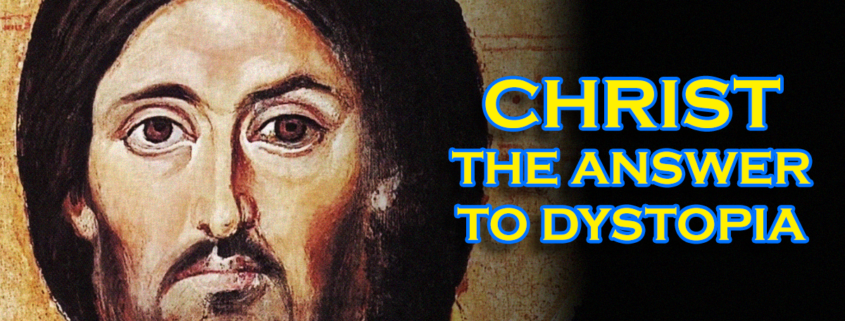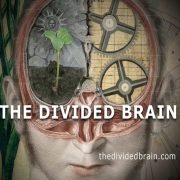Christ – The Answer to Dystopia
It would be a mistake to say that we are currently living in good times; more so, it would be downright deceiving. To say that this phase of evolution (if it is okay to term it as such) is somehow “good” is to treat human existence as some kind of trivial sports game, where human beings are divided up as collective entities and the conflict that permeates throughout these entities are just there for mere amusement. It would be far more appropriate to say that our current state is more akin to a dysfunctional family.
Our daily life consists of, more or less, incessant political posturing while attempting to one-up our neighbors in every regard. When normal, everyday people have conversations it is done quite frequently from behind avatars–inanimate images which in no way conveys uniqueness but rather seeks to blend in with the herd, both aesthetically and spiritually. To sum up this observation one only needs to imagine scrolling through the endless newsfeed of social media, through the countless profile pictures that do not even show the face of a person but are instead political slogans, advertisements, anime characters, etc.
In his book Understanding the Media, Marshall McLuhan wrote the following:
“It is sometimes a bit of a shock to be reminded that, in operational and practical fact, the medium is the message. This is merely to say that the personal and social consequences of any medium–that is, of any extension of ourselves–result from the new scale that is introduced into our affairs by each extension of ourselves, or by any new technology.”
With the advent of social media, we see clearly the change in thought processes and speech, and we can observe how they are shaped by our interactions with each other online. When we engage in conversation with people online, we largely engage with their avatars rather than with their persons. We engage with the slogans, the one-liners, and, at best, their ideologies; as a result, our attitude devolves into that of detachment and our language shortened, as if to say our neighbors aren’t worthy of our time. This is true not only of internet discourses but also real-world conversations. One affects the other as McLuhan points out.
The social media effect–the devaluing of persons–is just a micro-example of a larger issue. Our Enlightenment-era presuppositions give the impression that humanity has been elevated by secularist philosophies; quite the opposite is true. A movement of renaissance must always elevate the human person and not subject him to the environment. Berdyaev writes:
The fact that man receives light from the sun and that his life turns round the sun is an important sign of man’s subjection. The fact that the sun lighted man from without is an eternal reminder that man, like all things of this world, is by himself in everlasting darkness, having in himself no source of light. The sun should be in man, the centre of the cosmos: man himself should be the sun of the world, round which everything else revolved. The Logos-Sun within man should be giving light.1
Most of us are familiar with the dystopias depicted in countless science fiction stories of our time. It is probably safe to conclude that we today live in a much grittier and less fantastical version of those dystopias depicted in art. A common theme in those stories has always been technology, often artificial intelligence, overshadowing humanity to the point of making it a speck in an enormous neon jungle. In Ridley Scott’s Blade Runner, humanity has become a giant meat-grinding machine, leading us to sympathize with the created replicants. The devaluing of humanity, namely personhood, leads to the trivialization of relationships and, ultimately, the expulsion of those considered expendable.
Many are aware of this stark reality that we inhabit. As a result, many try to find solace in things such as activism, politics, spirituality, occultism, arts, etc. But these are all lifeless things–meaningless without the person aware of the intrinsic value of his personhood. Therefore, the value must come from somewhere historically and personally. This source must be none other than Jesus Christ–the God-man.
Why must it be Christ? Berdyaev makes the case for this:
Man is a microcosm; his is a rightly central and royal place in the world, because human nature mystically resembles the nature of the Absolute Man, Christ, and thus participates in the nature of the Holy Trinity. Man is not a simple creature, together with other created things, because the only-begotten Son of God, begotten before all worlds and of equal worth with His Father, is not only absolute God but Absolute Man. Christology is the only true anthropology. Christ, the Absolute Man, appeared on earth and in humanity and hence for ever confirmed a central significance in the universe for man and for the earth. Neither Copernicus’s astronomy nor Darwin’s biology can overthrow Christological anthropology, which surpasses this world, a truth which is truly before all worlds. Before the world was created the image of man already in the Son of God, born of the Father, before all time. Only the Christology of man, the reverse side of the anthropology of Christ, reveals in man the genuine image and likeness of God, the Creator.2
Once we have read the Gospel accounts and understood the person of Christ, we can see quite clearly that Christ speaks to our modern-day dysfunctional society like no one else. In this highly digitized age where we feel extreme isolation and alienation from the rest of humanity, Jesus’ example shows us how we must proceed. Take, for instance, Christ’s encounter with Zacchaeus in Jericho (Luke 19:1-10).
Zacchaeus was a tax collector, a member of a profession known to be despised because of their servitude to the Roman occupiers. In short, the people didn’t see Zacchaeus, they saw his avatar. When Jesus was passing through Jericho, Zacchaeus wanted to see who this famous Rabbi was, but there was one problem, he was a very short person and he couldn’t see Jesus over the crowd. So he ran and climbed to the top of a sycamore-fig tree to see Him.
Jesus caught sight of Zacchaeus and called to him. “Zacchaeus, come down immediately,” Jesus said, “I must stay at your house today.” Here, we must be reminded that it is very easy to look past certain cultural norms in ancient societies–norms that dictated how a person was to be treated based on his/her group identity. The crowd was astonished at Jesus’ words–that He would disregard the norms of the day so boldly. “He has gone to be the guest of a sinner,” they muttered. Indeed, Christ’s actions were earth-shattering, to say the least.
But let us take this story and place it in our modern-day context. Today, our group identities are our avatars dictated to us by politicians, technocrats, and the zeitgeist. We intensely argue with or ignore our fellow human beings, but barely know anything about them. Those who are staunch proponents of either capitalism or socialism say that human beings should be compensated based on their productivity, and that’s that; as if man lives on bread alone. But this is not the way of Jesus who calls us by our names and wants to dine with us.
Jesus not only gives us bread for our stomachs, as he gave to the five thousand (Matthew 14:13-21), but he also gives us that what is ever lacking in the kingdoms of this world: acknowledgment of personhood. In other words, if Jesus were present on social media today, there is a bigger possibility of Him sending you a DM and getting to know you than there is of Him saying something bombastic on Twitter.* The visions and trends of Big Tech companies would be meaningless to Christ; they are mere blips on His radar.
It is understandable to see why many of us remain disenchanted whilst going through our cubicles in a mundane manner. Imagine, for a second, a world where Christ’s recognition of our personhood spreads through each of us, individually, like wildfire in our highly digitized and connected age. What if we acknowledged that behind each “profile picture” or avatar there is a person who has an entire history and memories filled with joy, sorrow, grief, pain, concern, potential, love, etc? What if we spent more time on social media seeing our neighbors as “microcosms,” as Berdyaev put it, and “loving our neighbors as ourselves?”
“Community standards” would be trivial. Censorship would be obsolete. In the larger scheme of things, it must be safe to assume that our world wouldn’t be a dystopia anymore; but that’s just the tip of the iceberg. The method with which Jesus approached Zacchaeus yields the result that Zacchaeus displayed after conversing with Jesus. “Look, Lord!” Zacchaeus declared, “Here and now I give half of my possessions to the poor, and if I have cheated anybody out of anything, I will pay back four times the amount.” To say that our world wouldn’t be a dystopia would be an enormous understatement.
*If Jesus did post something bombastic on Twitter, it would be something like, “Make Your Neighbor Great Again!”
- Nikolai Berdyaev, The Meaning of the Creative Act.
- Ibid.












Leave a Reply
Want to join the discussion?Feel free to contribute!